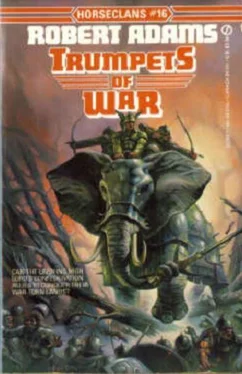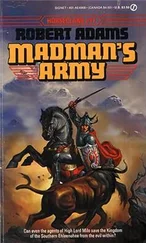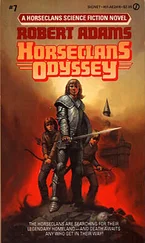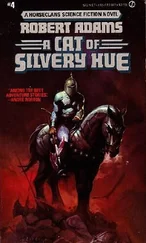During the long years of howling chaos in the Kingdom of the Southern Ehleenohee, they and their heterogeneous packs of deserters, banditti, unhung criminals, shanghaied peasants, city gutter scum and stray psychopaths had signed on as mercenary forces to quite a few warbands of the battling lords. Occasionally, they had actually given the services for which they had been paid, but more often they either had deserted en masse or had turned their coats at a crucial point of a battle, especially so if such ongoing conflict showed signs of being a close contest.
At length, so odious had their well-earned reputation become that no lord or city—no matter how desperate—throughout the length and breadth of the sundered realm would even consider hiring them on in any capacity. At that point, they proceeded to follow their natural inclinations, becoming out-and-out predatory ruffians, the leaders and their lawless followers at war against all the world.
Then, at long last, Thoheeks Zastros returned from his lengthy period of exile in the demon-haunted depths of the deadly swamps that surrounded and guarded the sinister Witch Kingdom . He brought with him a witch-wife from that land of dragons, magicians and sorcerers and marched back and forth across the lands, raising as he went an army much larger than the one he had led to defeat, years before, on the bloodsoaked field of Ahrbahkootchee.
With King Fahrkos and all his family dead in their gore in his blazing palace, the returned Zastros had had himself declared High King—a new title for the Kingdom of the Southern Ehleenohee—and crowned, then his forces had begun to scour the lands for warriors and men of the proper ages and degrees of soundness to serve in the huge army he was forming for the invasion of the Kingdom of Karaleenos and points farther north. At length, he led out his half-million and more on a path of supposed glory that would lead finally to a muddy, unmarked grave on the banks of the Lumbuh River for him and no grave at all for the bodies of the untold thousands of men and animals the bones of which would litter his line of march.
With the new High King, all of the nobility of warring age and a large percentage of both city and rural commoners on the road of conquest behind the Green Dragon Banner, Captains Mainahkos and Ahreekos had found themselves in a pigs’ paradise. Now they were able to prey not only on travelers and villages, unwalled towns and isolated holds, but on walled towns and smaller cities, as well.
They descended upon these now all but defenseless smaller cities like a pack of starving winter wolves upon so many sheepfolds; they behaved in their usual fashion—conduct that might have been called bestial, save that it would have shamed any wild beast. With all the onetime garrisons gone north with High King Zastros, the old men, women, boys and assorted cripples seldom held out behind their walls and gates for long, and when scaled by the forces of the bandit warlords, those walls shortly enclosed a slice of veriest hell on earth for all who had dwelt therein.
No female above the age of six was safe from the lusts of the marauders, nor did the perverts spare boys. The elderly and the very youngest were generally cut down at the beginning of an intaking with callous strokes of blades and stabbings of spears, and thus were they the luckier citizens, for it was after the first flush of bloodthirst was sated that the true horrors commenced.
After all visible wealth and goods had been plundered, then were the luckless inhabitants savagely tortured to extract possible hiding places of more loot, and torture for definite purpose often led to torture, maimings and indescribable mutilations for no purpose at all save the satisfaction of causing agony and hearing screams and pleas. Some of the pack delighted in such atrocious obscenities as forcing hapless sufferers to imbibe of unholy broths seethed of portions of their own bodies or those of spouses and children. Brutal men would gouge out eyes, rip out tongues, slice off breasts and sexual organs, noses and ears and lips, smash out teeth, sever leg tendons, then leave the bloody, croaking, flopping things to roast in the blazing ruins of their homes.
Of a day, however, a broken nobleman who had joined the bandit army to avoid starvation had words with Mainahkos and Ahreekos and slowly convinced them of the sagacity of those words. For all that they and most of their followers were now become wealthy beyond their former wildest dreams of avarice, each succeeding victory had cost and was costing them at least a few men, while men of fighting age or strength or inclination were become almost as precious as emeralds or rubies in this land stripped of warrior stock by High King Zastros’ strenuous impressments and recruitings atop the civil war and its years of carnage. Moreover, the few scattered survivors of witnesses to the intakings and occupations and burnings of the stinking charnel houses that the two warlords and their band had made of every city that had fallen to them had moved fast and spread the terrible word far and wide. Now, every walled enclosure within weeks of marching time had been forewarned and was doing everything possible to strengthen its existing defenses and had resolutely put aside any previous thoughts of trying to deal with the marauders on any near-peaceful basis.
So, although it went hard against the grain, the two warlords had begun to rein in their savages and even resist their own natural impulses and inclinations somewhat. They began to deal gently—gently by their personal lights, of course—with the inhabitants of any place that opened the gates without a Fight or showed a willingness to treat.
Mainahkos and Ahreekos even took it upon themselves to move against and either recruit or wipe out numerous smaller bands of their own ilk lurking about the countrysides. Then they began to recruit from the tiny garrisons remaining in a few of the larger walled towns and the smaller cities. Slowly, their howling pack of human predators began to metamorphose into a real, more or less organized, savagely disciplined army.
Therefore, by that day, now three years in the past, that they had appeared under the walls of the ducal city of Kahlkopolis—the onetime seat of the Thoheeksee of Kahlkos—the few straggling hundreds of ill-equipped, sketchily armed bandits that they had been in the beginning were become an impressive and very threatening sight indeed.
All classes of infantry marched in the ranks, fully armed and equipped. Heavy cavalry rode at head and tail of that column, with light cavalry on the flanks and van and riding close guard on the baggage train and the awesome siege engines, the large remuda and the beef herd. Only elephants were lacking, and this deficiency was partially alleviated through the use of old-fashioned war-carts as shock weapons and archery platforms—the
stout, reinforced cart bodies with scythe blades set in the wheel hubs, the big mules all hung with mail, the postillions fully armored having proved quite effective at the tasks of harrying and smashing in infantry lines for long years before the elephants had been trained for warfare.
The last Thoheeks of Kahlkos, one Klawdos, was by then nearly a decade dead, a casualty of the civil war. His wife and young son had disappeared during disturbances shortly after his demise, and the ducal city was just then being held by a distant cousin of the mostly extinct ancient line. The man was a bastard, with scant claim to any scintilla of noble heritage and even less to military experience.
Therefore, when this poseur ordered the gates of the city to be slammed shut and barred, the walls to be manned by the pitifully few men he owned to defend them, those still living of the ducal council of advisers did the only reasonable thing—they murdered him and left the city open to the overwhelming force outside.
Читать дальше












